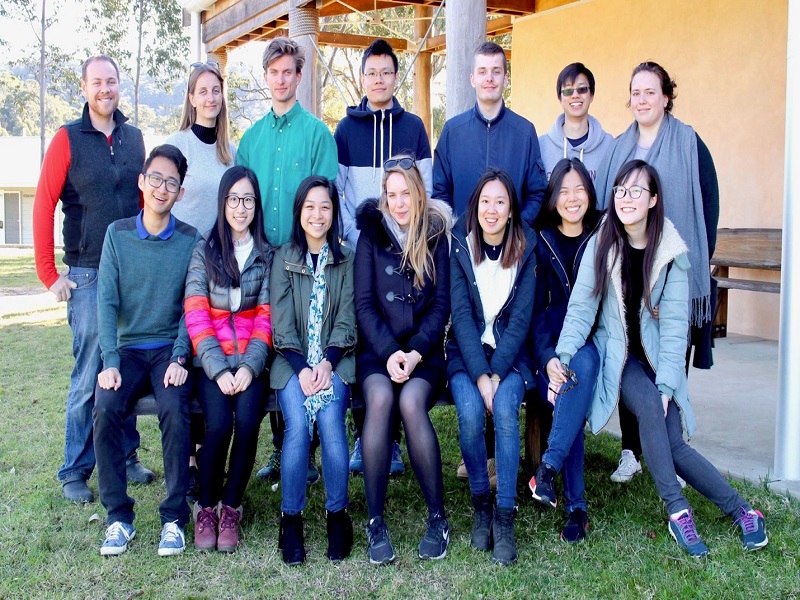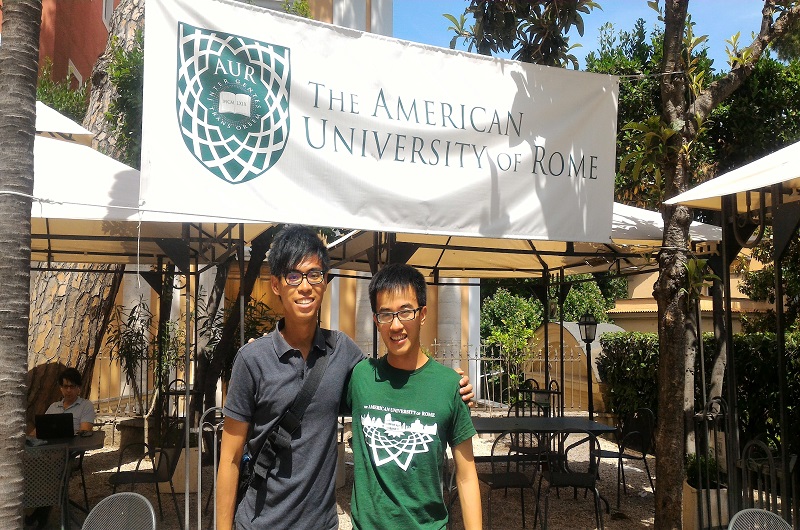Applying for Summer and Winter Programmes

A Different Summer Experience
Ang Wiew Boon on IARU Global Summer Programme (GSP) in Australia.
Preparing for Summer or Winter Programmes
Preparing for a summer or winter programme can be a very exciting process. For the best experience, please select a programme from the list of host universities that are recommended by the NUS Global Relations Office (GRO). You are encouraged to research on the course offerings, application requirements and procedures set by the host university, and attend the pre-departure briefings conducted by GRO before you embark on your journey.
To apply for a summer or winter programme, you must:
- Be a full-time NUS undergraduate;
- Complete the programme before your NUS conferment date;
- Meet the additional requirements (e.g. GPA score, English proficiency, etc.) imposed by the host university;
- Have a clean disciplinary record and be a strong ambassador for NUS; any disciplinary misconduct
during the programme will be handled according to both the host university and NUS’ policies;
- Complete the Travel Preparedness Course on Canvas.
Refer to the programmes listings for summer and
winter for the range of programmes
recommended by GRO. Click on the name of the host university to download an information sheet
specific to the programme. In addition to GRO-recommended programmes, you may approach the Dean’s
Office of your faculty to find out about faculty-specific programmes. You may
also wish to:
- Prepare an initial study plan and check with your home faculty to see if the courses offered by
the host university meets your academic objectives. Course mapping request is subjected to
approval from the faculties.
- Students may map up to a maximum of 10 units for each Summer Programme and up to a maximum of 5 units for each Winter Programme. Course mapping will be subject to approval from the respective
Faculties/Schools.
- Students who enroll in these programmes may request for a waiver of NUS tuition fees for the units they wish to transfer back to NUS. This waiver applies to up to 2 summer or winter programmes and up to a total of 12 units transferred during their course of study in NUS. Beyond
that, NUS Special Term tuition fees will apply, in addition to summer or winter programme fees paid
to the host university. For clarification, students may contact the SEP
administrators/coordinators at their respective home Faculty/School Dean's Office or the
academic department.
- Plan a budget to determine all costs associated with participation in your chosen programme. Please check the information sheet of each summer or winter programme for the estimated costs to be incurred.
Applying via EduRec grants you access to:
- Application for course mapping
- Application for financial aid
* Applying through EduRec will allow GRO to contact and assist you in times of crisis/emergency while
you are overseas. With an official application through EduRec, GRO can also provide you with
supporting letters for visa application and NS deferment (for NSmen).
Applications for summer programmes will open between November and February. Applications for winter
programmes will open between August and October. You should look out for emails from GRO and also
visit the our website regularly to check for updates.
Most host universities require a direct application to be submitted via their online application
portals. Unless stated otherwise in the programme information sheet, you should apply to the host
university immediately after you have applied in EduRec.
Follow the application instructions provided by the host university, and submit an application with
the necessary supporting documents to the host university before their stipulated deadline. Note
that the deadline varies for different programmes. Details of each programme can be found on the summer and winter programmes listing.
Due to the Personal Data Protection Act, NUS will not have access to the application information
that you submit to the host university directly. Host universities, as organisers of the individual
programmes, are best-placed to resolve any application issues. You should contact them before you
attempt to reach GRO, as this will save you time and effort.
You are responsible for submitting a complete application with the necessary supporting documents to
the host university before the deadline.
- NUS Transcripts - Apply at EduRec
- NUS Student Status Letter – Generate the letter from EduRec
Returning late from your programme is generally not encouraged. Note that your programme should not
delay the start of the new school term at NUS for you. If you need to request for late return,
please approach your home faculty for approval.
Additional Information:
After Applying

Summer at The American University of Rome: AUR Summer Program
Tiang Yi Long (left) with classmate at the campus garden of The American University of Rome.
After being accepted into programme
This section highlights the necessary things to do after you have applied via NUS EduRec and to the
host university.
GRO will issue you an offer for the programme in EduRec. This offer, when accepted, will allow you to apply for course mapping and financial aid; however, it does not constitute confirmation of your participation in
the programme. Confirmation of programme participation will be given by the host
university.
If you have applied for multiple programmes in EduRec and received more than one offer, note that the
system will only permit you to accept multiple offers if the programme dates do not conflict.
Ideally, you should only accept the offer for the programme that is your top priority.
After you have accepted your offer, you will be able to proceed with course mapping in EduRec.
Based on GRO’s annual survey, more than 80% of NUS students were able to map the courses taken during their summer or winter programmes.
Students may map up to a maximum of 10 units for each summer programme and up to a maximum of 5 units
for each winter programme. Course mapping will be subject to approval from the respective
Faculties/Schools.
Students who enroll in these Programmes may request for a waiver of NUS tuition fees for the units they wish to transfer back to NUS. This waiver applies to up to 2 summer or winter programmes and up to a total of 12 units transferred during their course of study in NUS. Beyond
that, NUS Special Term tuition fees will apply, in addition to summer or winter programme fees paid
to the host university. For clarification, students may contact the SEP
administrators/coordinators at their respective home Faculty/School Dean's Office or the
academic department.
Any questions on course mapping and unit conversion should be directed to your home faculty. Law students are generally unable to transfer unit for
summer programmes due to their special degree requirements. Please contact the Law SEP
coordinator for more details.
You will also receive an offer directly from the host university, usually via email and together
with instructions for making payment for the programme fee. Note that this offer is independent
from the EduRec offer given by NUS, and your acceptance of the host university offer constitutes
confirmation of your participation. You should only accept the offer and make payment to the
host university if you are comfortable with the academic and cost obligations of the respective
programme. If you choose to withdraw from the programme at this stage, you should notify the
host university, as well as withdraw your application in EduRec (or reject the offer if you
have not yet accepted it).
It is the student’s responsibility to pay the programme fees to the host university directly.
Acceptance offers by the host university remains conditional until the full payment of the
programme fee is made to the host university. The host university will set the terms and
conditions of the acceptance and the payment.
If you are paying via bank transfer, please read the terms and conditions of payment carefully.
Any bank charges and fees for wire transfers are your responsibility, and should be included in
the total amount payable in the request to your bank for the transfer.
Some host universities do not provide university accommodation for summer or winter programme participants. If the
university does not provide accommodation, you should start researching and securing
accommodation as early as possible. Note that some private accommodation providers will require
payment of a non-refundable deposit in order to guarantee your reservation. Read the terms and
conditions carefully before you sign and commit to any accommodation arrangements.
You should have enough monetary funds to last you throughout the whole programme. Your
decision to go on a summer or winter progrmame should not be dependent upon the confirmation of a scholarship or bursary
award.
You can consider the following avenues of financial aid.
Please note that if you are successful for any financial aid, the funds will only be disbursed
to you after August (for summer programme) and after January the following year (for winter
programme).
Some host countries requires you to apply for an entry visa prior to departure from Singapore. Please check the relevant embassy websites for more information.
Application Procedures
After you have applied in EduRec and received confirmation of acceptance from the host
university, you can request GRO to issue a supporting letter suitable for any of the following
purposes:
- Application for NS Deferment
- Application for visa to host country
- Applications for OSP Loan
To request for the letter, submit your request by completing this form: https://forms.office.com/r/WDcUWgkWdX.
You should take note of the host university’s recommended arrival dates for your programme, and
join the orientation (if any) conducted for programme participants. Early check-in to on-campus
accommodation is usually not allowed and is at the discretion of the host university. Check
directly with the host university if there is a pressing need to check-in early.
You are responsible for purchasing your own air-tickets. Air-tickets should only be bought after
you have received the required visa for your programme. If a visa is not required, you may proceed to
purchase the air-tickets upon the receipt of the official acceptance letter from the host
university. The Singapore Ministry of Foreign Affairs (MFA) issues helpful travel advisories
which you should heed whilst planning your travel itinerary.
GRO-recommended programmes are covered under the insurance scheme for official NUS trips.
Click here for details about the terms of coverage and process for lodging claims.
If you require additional insurance coverage for your personal needs, consider purchasing your
own personal travel insurance with your preferred insurance provider.
- Attend the Pre-Departure Briefings conducted by GRO and take the opportunity to network with other students
going to the same country and/or host university. Due to the Personal Data Protection Act,
GRO is not able to share the contacts of other students with you.
- Learn how to better represent NUS at your host university during the Pre-Departure Briefings
- eRegister with MFA – for Singaporeans and Singapore Permanent
Residents only
- Update your contact information and Next-of-Kin information in EduRec, so that NUS will be able
to contact you or your family in any case of emergency. GRO will not be able to contact
nor assist you, if you do not apply for the programme via EduRec.
Additional Information:
While on the Programme

Do what the locals do
Photo contributed by Nur Hidayah Bibi Binti Haji Mohamed Omar who visited University of Edinburgh, UK.
Before you return to NUS
Summer or winter programmes are of shorter duration and it is important to take note of the things which you need to do
before you return back to NUS to continue your studies in the next semester.
Step 1: Arrange the Mailing of Transcripts
A small number of host universities require you to submit a request for your summer or winter programme transcript, and will provide
you with instructions to complete this step.
The transcripts will either be mailed to you directly or sent to Global Relations Office (GRO), depending on the
programme. You will be informed by the Programme Manager nearer the date on how your transcript will be received
or you can refer to the information which we have prepared on the summer or winter programmes listing page
You will need to show the host university’s transcript to your home faculty in order to complete the unit
conversion process at NUS.
Step 2: Complete Online Survey
You will receive an email from GRO to complete an online survey about your summer or winter programme experience. This will take 5 to
10 minutes of your time, and your comments will help future batches of NUS students.
Step 3: Submit Student Experience Report
Student experience reports have been useful resources for students considering/preparing to go on short-term programmes. Share your experience, useful tips and photographs with future participants by submitting a Student Experience Report.